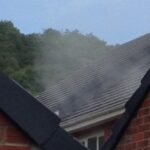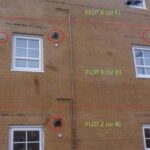In June 2013 when Dr Littlewood was two months from the end of a three year research project investigating/undertaking diagnostic in-construction tests to identify potential defects during the construction of low carbon dwellings that could impact upon thermal performance, he identified a weakness which could be detrimental to fire performance.
Between 2014 and 2015 whilst working as the Managing Director for Sustainable Construction Monitoring & Research Ltd, Dr Littlewood developed the first iteration of his Building Fire Safety Protection & Resistance Testing, Measurement and Reporting (BFS&R) process to test, measure and report on inadequate and defective active and fire protection measures in dwellings and buildings. Dr Littlewood’s results demonstrated three years before the disastrous Grenfell fire that in the UK, dwellings can easily fail minimum fire performance requirements between seconds and minutes, where smoke, fire and toxic gas should be prevented from spreading for between 30, 60 or 120 minutes. The results showed that ventilation and electrical ducting if installed incorrectly provided unwanted and unintended concealed pathways for smoke, toxic gas and fire to easily spread between dwellings. Also, Dr Littlewood demonstrated that active fire and smoke alarms do not always activate and therefore demonstrating that commissioning of these systems is not always undertaken correctly. Dr Littlewood’s results also highlighted that the same defects that could allow smoke, fire and toxic gas to easily spread between dwellings and could also allow pathways for sound and heat loss/gain and therefore potentially to impact upon acoustic and thermal performance. Indicating inadequate compartmentation. See slide 13, for some results from Dr Littlewood’s work developed by Sustainable Construction Monitoring & Research Ltd and the SuRBe group at Cardiff Metropolitan University The building performance defects illustrated could be due to a range of issues, such as lack of inspection of installed products, damage to installed fire stopping products and alarms during the construction process, no stopping products installed, or a combination of these issues.
The proprietary know-how created by Dr Littlewood on behalf of Sustainable Construction Monitoring and Research Ltd and the SuRBe group at Cardiff Metropolitan illustrates the issues with fire performance. Plus, the linkages with acoustic and thermal performance and has raised a series of questions to investigate further. As such this enabled Dr Littlewood to win the following successful research grants at Cardiff Metropolitan University, working in collaboration with industry.
2015-2017, Research Enterprise Innovation Fund (REIF) in collaboration with Coastal Housing Group and the University of Plymouth. Investigating fire performance in general needs housing.
2018-2020, Smart Expertise in collaboration with a number of housing associations to implement the BFS&R Protocol into their fire risk assessments in existing specialised dwellings across Wales. This is to enable identification of both inadequate active and also passive fire protection measures, which can be upgraded so that specialised dwellings provide a healthy and safe environment for their vulnerable tenants. Funded 50% by the Welsh Government.
2018-2020, Research Innovation Award 2, in collaboration with a number of partners to investigate and test further the connections between thermal, acoustic and fire (TAF) performance in new dwellings during the detailed design, construction and commissioning processes.
2018-2020, the University partner in the Home Grown Homes project, led by Woodknowledge Wales to investigate the challenges of producing high performance and healthy homes from timber grown in England and Wales.
Furthermore, this work has led to support from the UK Fire and Rescue Service (FRS). As a result Dr Littlewood is working with the Computer Science department (lead) from Cardiff Metropolitan University, and also artificial intelligent staff from Huddersfield University in collaboration with South Wales Fire and Rescue Service on a EPSRC funding application to enhance the management information system to better predict fire risk in buildings and when to action the Fire Audit.
References
Littlewood and Smallwood, 2017

